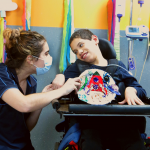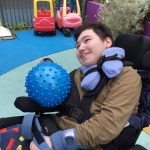I grew up watching the NRL and in particular I loved the state of origin matches. The clash between the cane toads and the cockroaches, filled with larger than life warriors like big Mal, Fatty and of course the King, Wally Lewis. Titans of the rugby league field, a symbol of strength, courage and toughness, but in 2006 on live television king Wally unwittingly revealed a deeply hidden secret that he had managed to keep hidden for years. While reading his nightly sports report for the evening news Wally Lewis said “Good Evening,” and then stumbled for words. On live TV the Emperor of Lang Park had a seizure. Producers scrambled to cut to another story but it was too late, the secret was out. The next night Lewis bravely revealed to the nation that he had epilepsy.
Wally Lewis isn’t alone. Theodore Roosevelt, Danny Glover, Neil Young and Prince are among those that have been diagnosed with epilepsy. In 2015 Buddy Franklin, from the Sydney Swans, had a seizure in Bondi which the newspapers reported as a mental illness. 1% of the Australian population have been diagnosed with epilepsy, and yet it is still sometimes misunderstood, and to be fair it remains somewhat of a mystery.
Epilepsy is a neurological condition which results in a disruption of the electrical activity in the brain. People who suffer from epilepsy experience sudden and recurring seizures which if not properly managed can seriously effect quality of life. However, because of a growing understanding of the condition, many people with epilepsy live full and relatively unaffected lives.
Epilepsy is a mysterious condition with causes that are not always fully understood. Many people develop the disorder in childhood and outgrow it, while others have it for a lifetime.
Seizures can be disruptive and sometimes cause injuries, but they can be controlled with treatment. As these accomplished people demonstrate, epilepsy doesn’t have to stop you from enjoying your life and finding success in all that you do.
Did you know? Epilepsy is more likely to be diagnosed in children or people in their later years of life.
There are still many people who have epilepsy where the cause is unknown. Anything that causes damage to the brain can result in epilepsy, including injuries, brain infections or strokes. The seizures caused by epilepsy are a sudden rush of electrical charge to the brain. While most people associate physical convulsions with seizures, some seizures do not involve this symptom. They can look different for everyone – ranging from changes in behaviour, awareness or movement.
What are the triggers?
While the most well-known trigger for epilepsy is rapidly flashing light there are lots of other triggers too. These include:
• Heat
• Lack of sleep
• Stress
• Missed medication
There are now a large range of treatment options available for those with epilepsy. Over the past few decades, these treatments have become more and more effective. 70% of people on epilepsy medication become seizure free. A Vagus Nerve Stimulation device (like a pacemaker for brain activity) is another treatment option. Special diets such as the Ketogenic diet have proven to be helpful in assisting those living with epilepsy.
Purple Day
The 26th of March is Purple Day, an international day for the recognition and support of those living with epilepsy. Started in 2008 by an 8 year old Canadian girl, Cassidy Megan, the day aims to raise awareness and solidarity for people with epilepsy. Cassidy began the day because of her own struggles with the condition and it is now a great opportunity for our communities, schools and organisations to become better educated about epilepsy and raise money for further research.
There are lots of ways you can support Purple Day this year. Why not wear an item of purple clothing? Purple is the globally recognised colour for epilepsy. Epilepsy Action Australia suggests these ways of getting involved on the 26th of March:
• Host a fundraising morning tea, BBQ or bake sale
• Get your local school involved with mufti-days, sports days or bake sales
• Buy Epilepsy Action Australia merchandise
• Be a media spokesperson – tell your own story of epilepsy
• Make a donation!
Here at Allowah, we know how important days like this can be for raising community awareness and support of all sorts of conditions. We love to see our friends and family gather together to learn, share and support! We will be commemorating Purple Day on the 26th of March 2018, and we hope you will be too.





